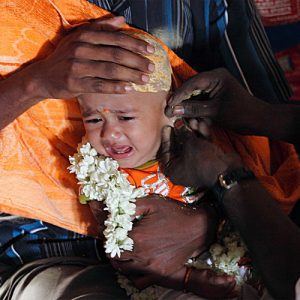A Guide to Caring for Your Karna Vedha Piercing
Introduction
Ear piercings are not merely adornments; they often carry deep cultural and spiritual significance. Among the rich tapestry of ear-piercing traditions, the Karna Vedha is a revered practice deeply ingrained in Hindu culture. Rooted in ancient rituals and beliefs, Karna Vedha symbolizes beauty, spiritual awakening, and protection. In this LinkedIn post, we’ll delve into the profound significance of the Karna Vedha ear piercing and provide essential insights into caring for this sacred adornment.

Understanding Karna Vedha
Karna Vedha, or Karnavedha or Karnavedham, is a traditional Hindu ear piercing ceremony typically performed during childhood. This ancient practice finds its roots in the Vedas, the sacred scriptures of Hinduism, and is regarded as one of Hindu culture’s 16 sanskaras or sacraments. Conducted by a priest or elder family member, the ceremony involves piercing the earlobes with a needle or specialized instrument.
However, the significance of Karna Vedha transcends mere aesthetics; it is deeply intertwined with spiritual and cultural beliefs. The piercing is thought to open the inner ear to divine knowledge and shield the individual from malevolent forces. Additionally, it serves as a rite of passage, marking a child’s transition into adulthood and acceptance into the community.
The Importance of Care
Proper care is crucial for ensuring the healing and well-being of a Karna Vedha piercing. While the piercing procedure may be brief, healing requires patience, attentiveness, and meticulous hygiene. Here are some essential tips for caring for your Karna Vedha piercing:
- Maintain Cleanliness: Cleanse the pierced area daily with a saline solution or gentle soap and water to remove debris or bacteria. Avoid using harsh substances like alcohol or hydrogen peroxide, as they can delay healing.
- Hands Off: Resist the urge to touch or manipulate the earring during healing. Doing so can introduce bacteria and irritate the piercing, prolonging recovery.
- Follow Aftercare Instructions: Adhere to the aftercare instructions provided by your piercer diligently. They may recommend specific products or techniques to facilitate healing and prevent infection.
- Exercise Patience: Healing times vary from person to person, but typically, it takes several weeks to a few months for a Karna Vedha piercing to fully heal. Refrain from prematurely changing or removing the earring, as this can disrupt the healing process.
- Monitor for Signs of Infection: Look for signs of infection, such as excessive redness, swelling, pain, or discharge. If you notice any of these symptoms, seek medical attention promptly.
 Embracing Tradition
Embracing Tradition
Beyond the physical care of the piercing, it’s essential to embrace the cultural and spiritual significance of the Karna Vedha tradition. This practice is not merely a cosmetic enhancement but a symbol of heritage, identity, and spiritual connection. By honouring this tradition and treating your piercing with reverence and respect, you not only nurture your physical well-being but also pay homage to the wisdom and traditions of your ancestors.
Conclusion
The Karna Vedha ear piercing is more than just a fashion statement; it’s a sacred tradition that embodies centuries of cultural and spiritual wisdom. As you embark on this journey of self-expression and spiritual awakening, remember the importance of caring for your piercing with diligence and respect. By following proper aftercare techniques and embracing the traditions behind Karna Vedha, you can ensure a safe and meaningful experience honouring your heritage and individuality.






